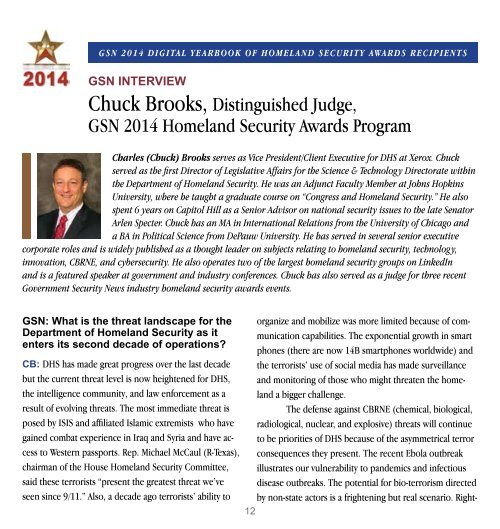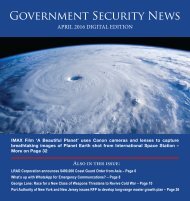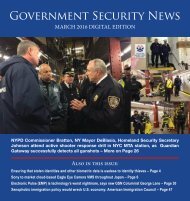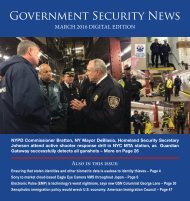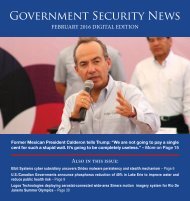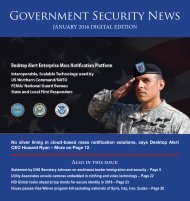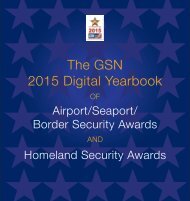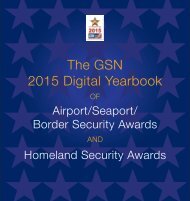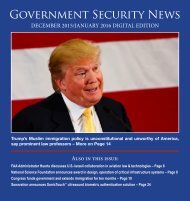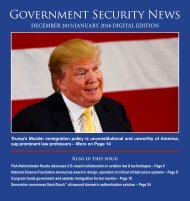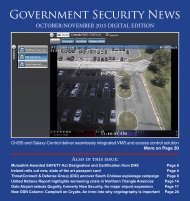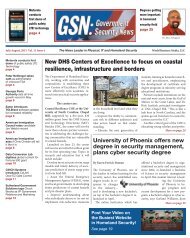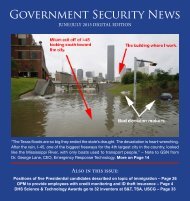2014 Digital Yearbook of Homeland Security Awards
You also want an ePaper? Increase the reach of your titles
YUMPU automatically turns print PDFs into web optimized ePapers that Google loves.
GSN <strong>2014</strong> <strong>Digital</strong> <strong>Yearbook</strong> <strong>of</strong> <strong>Homeland</strong> <strong>Security</strong> <strong>Awards</strong> Recipients<br />
GSN INTERVIEW<br />
Chuck Brooks, Distinguished Judge,<br />
GSN <strong>2014</strong> <strong>Homeland</strong> <strong>Security</strong> <strong>Awards</strong> Program<br />
Charles (Chuck) Brooks serves as Vice President/Client Executive for DHS at Xerox. Chuck<br />
served as the first Director <strong>of</strong> Legislative Affairs for the Science & Technology Directorate within<br />
the Department <strong>of</strong> <strong>Homeland</strong> <strong>Security</strong>. He was an Adjunct Faculty Member at Johns Hopkins<br />
University, where he taught a graduate course on “Congress and <strong>Homeland</strong> <strong>Security</strong>.” He also<br />
spent 6 years on Capitol Hill as a Senior Advisor on national security issues to the late Senator<br />
Arlen Specter. Chuck has an MA in International Relations from the University <strong>of</strong> Chicago and<br />
a BA in Political Science from DePauw University. He has served in several senior executive<br />
corporate roles and is widely published as a thought leader on subjects relating to homeland security, technology,<br />
innovation, CBRNE, and cybersecurity. He also operates two <strong>of</strong> the largest homeland security groups on LinkedIn<br />
and is a featured speaker at government and industry conferences. Chuck has also served as a judge for three recent<br />
Government <strong>Security</strong> News industry homeland security awards events.<br />
GSN: What is the threat landscape for the<br />
Department <strong>of</strong> <strong>Homeland</strong> <strong>Security</strong> as it<br />
enters its second decade <strong>of</strong> operations?<br />
CB: DHS has made great progress over the last decade<br />
but the current threat level is now heightened for DHS,<br />
the intelligence community, and law enforcement as a<br />
result <strong>of</strong> evolving threats. The most immediate threat is<br />
posed by ISIS and affiliated Islamic extremists who have<br />
gained combat experience in Iraq and Syria and have access<br />
to Western passports. Rep. Michael McCaul (R-Texas),<br />
chairman <strong>of</strong> the House <strong>Homeland</strong> <strong>Security</strong> Committee,<br />
said these terrorists “present the greatest threat we’ve<br />
seen since 9/11.” Also, a decade ago terrorists’ ability to<br />
12<br />
organize and mobilize was more limited because <strong>of</strong> communication<br />
capabilities. The exponential growth in smart<br />
phones (there are now 14B smartphones worldwide) and<br />
the terrorists’ use <strong>of</strong> social media has made surveillance<br />
and monitoring <strong>of</strong> those who might threaten the homeland<br />
a bigger challenge.<br />
The defense against CBRNE (chemical, biological,<br />
radiological, nuclear, and explosive) threats will continue<br />
to be priorities <strong>of</strong> DHS because <strong>of</strong> the asymmetrical terror<br />
consequences they present. The recent Ebola outbreak<br />
illustrates our vulnerability to pandemics and infectious<br />
disease outbreaks. The potential for bio-terrorism directed<br />
by non-state actors is a frightening but real scenario. Right-


